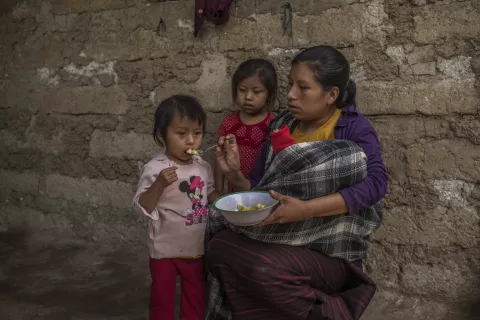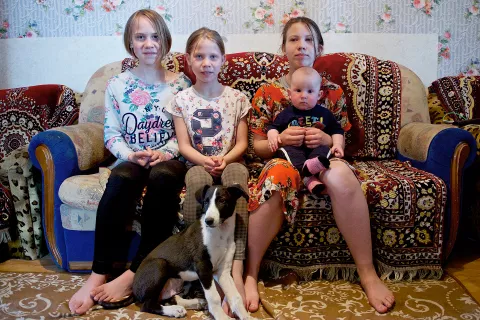Understanding poverty through the child's perspective
UNICEF and Ministry of Commerce to initiate a child development project in Quannan County
- Available in:
- 中文
- English
2 September 2015, Beijing – In an effort to address child poverty and reduce inequality, the Ministry of Commerce (MOFCOM), Quannan County Government and UNICEF have announced a new pilot project that seeks to improve child development outcomes and tackle the impact of multi-dimensional child poverty.
Despite China's enormous success in reducing poverty and lifting millions of people out of poverty over the last three decades, challenges remain with many people still living under the poverty line or just above it, while inequality rates grow within and between regions.
For children, only measuring economic indicators can often fails to capture the critical social investments needed for a child to survive and thrive. Deprivations can include the absence of care givers, to the lack of access to adequate health care, water and sanitation, to access to quality learning to lack of protection from abuse and violence. Global evidence also illustrates that poverty in childhood can create a legacy of deprivation which is passed on to the next generation.
“If a child is to grow up and develop to his or her full potential, we need to take a much more comprehensive approach to understanding and ending child poverty. Focusing on income in a family is an important indicator of poverty, but can fail to capture whether a child has adequate care and support, or access to basic services. There are many factors that contribute to strong child development outcomes that we must together address, ” said Jillian Popkins, Chief of Social Policy and Reform for Children at UNICEF China.
While economic progress has been made, Quannan County, home to 200,000 people, living in nine townships, and located in Jiangxi Province, like many places in China, has seen growing inequality and is home to an estimated 3,200 children left behind with one or more parent absent.
Under the partnership, the project which will be designed this year, will seek to improve child development outcomes by focusing on building better systems to measure child poverty and inequality, and reduce them through more targeted measures. A child support grant will be piloted to support families to invest more in children. Cash transfers are already operational in 45 countries globally and those with a focus on children have been proven to help improve nutrition and health outcomes, increase school attendance, and reduce social exclusion and poverty.
The design of the child support grant would seek to complement China's well-established system of cash transfers to the poorest households (dibao) as well as to groups of children, such as orphans or children with disabilities, by aiming to make sure it reaches every child in need. There will be a strong focus on ensuring that the new approach creates efficiencies in the existing systems and is as cost effective in China as it has been proven to be in other contexts.
“It is impressive to see the commitment by the Government of China to continue to find new ways to address child poverty and reduce inequalities in child development outcomes. We hope through this collaboration, we not only are better able to understand and measure the impact of child poverty, but also through piloting the child support grant, build a case for more investment in child development outcomes,” Popkins added.
Media contacts
About UNICEF
UNICEF works in some of the world's toughest places, to reach the world's most disadvantaged children. Across 190 countries and territories, we work for every child, everywhere, to build a better world for everyone. For more information about UNICEF and its work for children visit www.unicef.org.
| Visit UNICEF China website: www.unicef.cn Follow us on Sina Weibo: http://weibo.com/unicefchina Tencent Weibo: http://t.qq.com/unicef Wechat: unicefchina |




